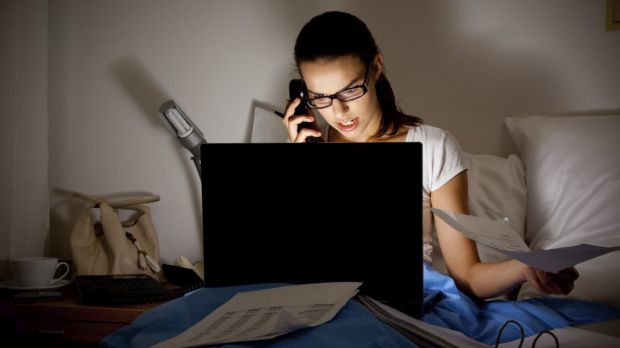
Busting the productivity myth: Being connected 24/7 does not allow for reflection on ‘how you do things’, say researchers. Photo: iStock
Checking emails in bed late at night may seem like time well spent, but researchers have found that after-hours use of smartphones and other devices is counterproductive.
The assumption that a 24/7 connection to technology made workers more productive was a misconception because it could interfere with the quality of work, said Peter Holland, of the Department of Management at Monash University.
”People finish work at 5pm, but they are still touching their iPads and checking their phones because they don’t switch off from work,” Associate Professor Holland said.
”More and more in high-skilled jobs and knowledge work, you need time off to step away from work and have downtime and reflection time on how you do things.”
Many companies ensured employees were constantly ”wired up” to the internet, he said. ”But they don’t see the downside that they aren’t getting quality. You start to get the burnout factor and people saying, ‘I just can’t think’.”
Around the world, companies such as Volkswagen in Germany are blocking after-hour access to emails to protect employees from information overload.
”There is a growing push to say that if you want quality, companies are needing to filter information,” Associate Professor Holland said.
A study by researchers from Michigan State University and the universities of Washington and Florida has found the benefits of smartphone use outside the office, particularly late at night, are negated when employees are unable to switch off from work to recharge their batteries.
The study, in the journal Organisational Behaviour and Human Decision Processes, found that while many employees were provided with smartphones because they provide instant access to electronic information, they ”may in fact have an effect that is opposite from what companies intend”.
”Although smartphones provide ready access to work emails and documents that facilitates connectivity to work, they may also interfere with employees’ sleep and replenishment of regulatory resources,” the US researchers said. ”Moreover, when employees fail to replenish depleted resources, their engagement at work suffers the following day.”
Yvette Blount, a lecturer in the department of accounting and corporate governance research at Macquarie University, said her research had found that many employees who work from home feel compelled to check their emails out of work hours. ”It is not necessarily the case that people have a better work-life balance with all the technology if you don’t disconnect,” Dr Blount said.
